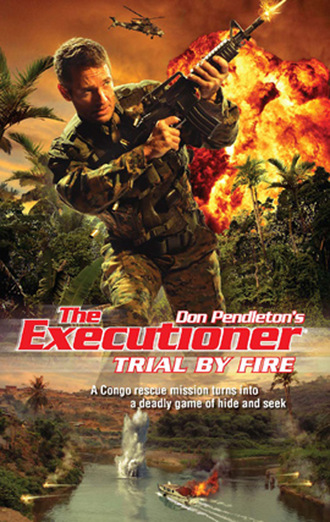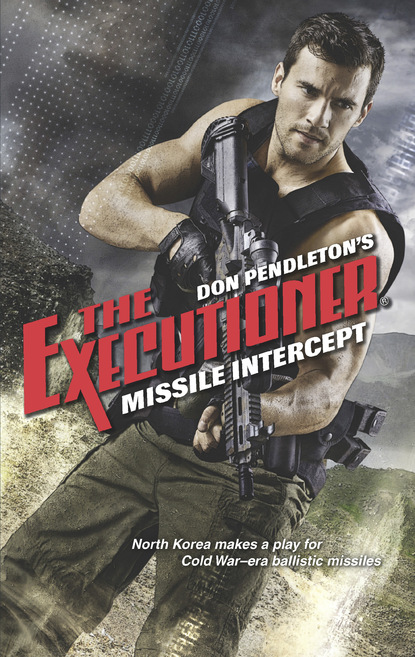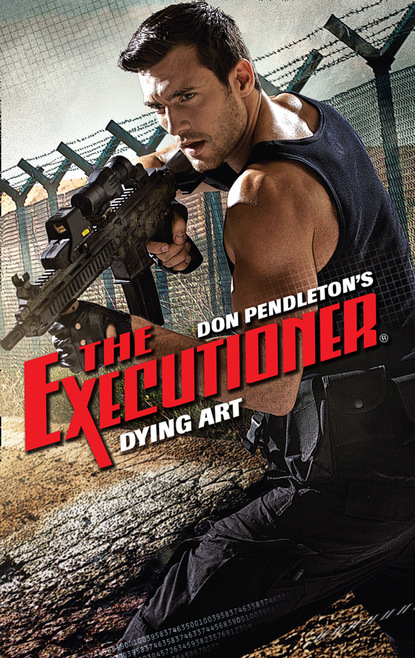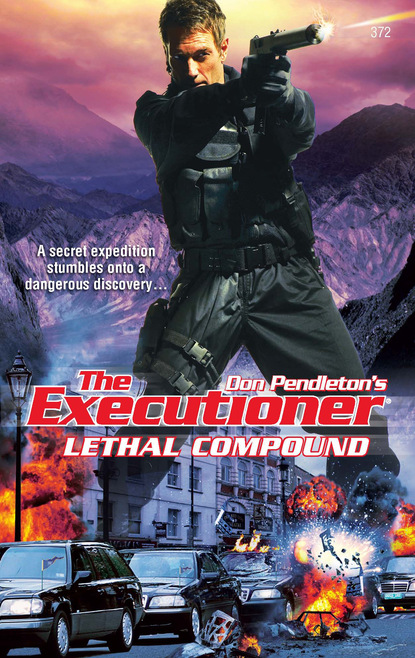
Полная версия
Trial By Fire

“Our enemies outnumber us, but we are the superior force.”
The Executioner rose to his feet. “Nenad’s men are terrorists, not soldiers. They get others to commit their atrocities for them. But here in the jungle they are going to have to do their own fighting. They are not ready for what Niner Squad has become.”
Cadet Jovich rose and the rest of the squad rose with him. “No way in hell they’re ready for us.”
“Caesar’s men are jungle fighters, but they have been terrorizing unarmed villages for far too long. They are not ready for what you have become.”
Cadet Eischen intoned Bolan’s earlier words. “We shoot them until they’re all down or we are.”
Bolan shoved his right hand out into the middle of the circle. The rest of the squad huddled up and put their hands on top of his. “And though we walk through the valley of the shadow of death, we shall fear no evil…for we are Niner Squad, the apex predators and the meanest sons of bitches in the valley.”
“Amen, Sergeant,” Cadet Johnson said.
“On me, call out!” Bolan looked around and saw the steel in the backbone of his people. “Niner!”
The squad instantly shouted back, “Squad!”
Bolan raised his hand beneath the squad’s and they snapped their hands down to break the huddle. “Be ready to move in an hour.”
The Executioner ®
Trial by Fire
Don Pendleton’s

A brave man may fall, but he cannot yield.
—Latin Proverb
When odds are stacked against you, and the enemy seems too big, stand up. Stand up and fight. It is might and heart that are the deciding factors in every great battle.
—Mack Bolan
THE MACK BOLAN LEGEND
Nothing less than a war could have fashioned the destiny of the man called Mack Bolan. Bolan earned the Executioner title in the jungle hell of Vietnam.
But this soldier also wore another name—Sergeant Mercy. He was so tagged because of the compassion he showed to wounded comrades-in-arms and Vietnamese civilians.
Mack Bolan’s second tour of duty ended prematurely when he was given emergency leave to return home and bury his family, victims of the Mob. Then he declared a one-man war against the Mafia.
He confronted the Families head-on from coast to coast, and soon a hope of victory began to appear. But Bolan had broken society’s every rule. That same society started gunning for this elusive warrior—to no avail.
So Bolan was offered amnesty to work within the system against terrorism. This time, as an employee of Uncle Sam, Bolan became Colonel John Phoenix. With a command center at Stony Man Farm in Virginia, he and his new allies—Able Team and Phoenix Force—waged relentless war on a new adversary: the KGB.
But when his one true love, April Rose, died at the hands of the Soviet terror machine, Bolan severed all ties with Establishment authority.
Now, after a lengthy lone-wolf struggle and much soul-searching, the Executioner has agreed to enter an “arm’s-length” alliance with his government once more, reserving the right to pursue personal missions in his Everlasting War.
Contents
Chapter 1
Chapter 2
Chapter 3
Chapter 4
Chapter 5
Chapter 6
Chapter 7
Chapter 8
Chapter 9
Chapter 10
Chapter 11
Chapter 12
Chapter 13
Chapter 14
Chapter 15
Chapter 16
Chapter 17
Chapter 18
Chapter 19
Epilogue
1
Democratic Republic of the Congo
The flight attendant screamed as the machete was brandished beneath her nose and recoiled against the fuselage. The men laughed unpleasantly. The captives cowered cross-legged with their wrists bound behind them beneath the remaining wing. The man with the machete dragged the tip of his blade down the woman’s throat and let it rest on her collarbone. He grinned over his shoulder and said something choice to his confederates in Swahili. The men laughed again.
Mack Bolan, aka the Executioner, screwed the launcher-adapter onto the muzzle of his submachine gun and began his creep.
The Bombardier Challenger 604 jet lay in the little valley below like a stricken bird. This type of aircraft was classified as a heavy private jet. The twin-engine bird was configured to carry up to ten passengers in very swanky style. The smoldering scar in the 604’s tail section said someone had salted its tail with a shoulder-launched surface-to-air missile.
The pilot had been good. It was obvious that he had crash-landed rather than crashed. He’d aimed for the little valley that opened up a slot in the jungle canopy and hit the creek that divided it like a runway. He’d lost his starboard wing on a tree, but the fuselage looked to be mostly intact. A heavy tree bough hung brutally speared through the cockpit in a way that looked like it had gone very badly for the pilot.
Bolan descended to the valley floor. He caught the unmistakable stench of burned human flesh.
Rescue missions were one of the soldier’s least favorite activities. If the situation was bad enough to send him as the final option, the situation was just about FUBAR. Solo missions on foot in equatorial Africa in summertime were about as bad as rescue missions got. Among the host of all things FUBAR about this mission was the fact that all of his equipment had been begged, borrowed or stolen for him by the CIA station in Pretoria. By the same token it could have been worse. South Africans had a well-deserved reputation for solid kit. The old L42A1 “Enforcer” sniper rifle over Bolan’s shoulder was a forty-year-old Pretoria police issue, but it was tough. The BXP submachine gun in Bolan’s hand was the size of a large pistol and a cleaned up, optical-sighted version of the old US 1980s-era MAC-10.
An example of the BXP’s more interesting features was that it was one of the few submachine guns that had ever been adapted to fire rifle grenades.
Bolan clicked a riot grenade onto the launching rings of his weapon as he came within one hundred yards of the situation.
He counted nine hostiles. They were Africans, but they wore no uniforms of any of the local armies within shouting distance. Most of them were armed with ChiCom AK knock-offs. The bad guys were at an extremely low state of alert and seemed to be in a jovial mood. While half were busy ransacking suitcases and carry-ons taken from the plane, the rest were watching what the man wielding the machete was going to do to the flight attendant next with avid and concupiscent interest.
Bolan counted ten captives. Eight were U.S. Military preparatory school cadets huddled in a line beneath the wing. The remaining two were crew. The flight attendant was in midassault, and a person who appeared to be the copilot lay off to one side and in very bad shape. As the soldier circled in, he found his assessment of the pilot’s fate was correct. He had been killed in the crash, and the survivors had buried him. The invaders had exhumed the pilot’s corpse, stripped it, emasculated it and pinned it upside down against the fuselage with tent spikes and burned it.
The flight attendant screamed as the man with the machete hacked off the pilot’s hand. The corpse sagged on the three points still holding it in place. Machete man picked up the charred, fallen extremity and breathed over it like a man smelling pork chop that had just come out of the oven. The flight attendant crushed herself against the curve of the fuselage. Machete man raised his blade and pushed it hard enough between the woman’s clavicles to draw blood. He shoved the severed hand beneath her nose and snarled. Bolan didn’t speak Swahili but he was pretty sure the man had said “Eat!”
The man shoved the hand against the woman’s face and shouted in English, “Eat!”
The other invaders laughed.
Bolan raised his BXP and fired.
The one-and-half-pound South African riot grenade hit the man in the side of the head at about eighty miles per hour. He dropped the machete and rubbernecked three steps sideways into the wing with the embedded grenade ejecting its multiple skip-chaser bomblets out of his skull like a slot machine paying off. Bolan wrenched the rifle-grenade rings off his weapon and spun the suppressor tube onto his smoking muzzle. Thick gray gas began to fill the camp like a fog.
Two men turned towards the sound of the grenade’s launch-thump, but Bolan had already moved. The two men sprayed the underbrush on full-auto. Bolan put 3-round bursts through each man’s chest and kept circling. South Africans knew something about riots, and the bomblets were filling the area with gas with remarkable efficiency. The jungle fighters had clearly never been exposed to CS. They stumbled about waving their arms and firing their guns in all directions. Two of the smarter ones turned their weapons on the captives. Bolan burned down both men before they could get off a shot.
A guerrilla caught sight of Bolan through his streaming eyes and charged, waving a panga and screaming hysterically. The Executioner’s first burst staggered him, and the second sent him sprawling into the mud by the creek. The soldier kept circling. His weapon made a suppressed snapping noise, but between the gas, the screaming and AK full-auto fire the enemy still hadn’t spotted him.
Two of the cadets jumped up to make a run for it.
“Cadets! Stay down!” Bolan roared.
They were teenagers, but they were U.S. Military teenagers and they were used to being bellowed at. The two cadets dropped like rocks. Bolan’s yell had a wonderfully focusing effect on the remaining five guerrillas. They spun on their oppressor. The soldier knocked them down like bowling pins. The BXP racked open on a smoking empty chamber with two targets still standing. Bolan dropped the spent weapon and slapped leather for the South African police pistol on his belt. A rifle bullet cracked by his head far too close for comfort. Bolan double-tapped each assailant in the chest to cease hostilities and two more in the face to put them down.
The pistol racked open on empty. The screaming and shooting had stopped. The camp was quiet except for sobbing and choking, and the hiss of the CS munitions.
Bolan took a deep breath and strode into the gas.
He drew his knife and slashed the bonds of each cadet “Get out of the gas! Stick your heads in the creek! Go! Go! Go!” Bolan hooked the copilot under the arms. He had two broken legs, was gut-shot and the gas wasn’t doing him any favors.
“You!” Bolan shouted at the flight attendant. “Help me!” Bolan dragged the copilot to the creek. Cadets lay prone in a line with their heads in the water like horses that had galloped a hundred miles.
Bolan lay the copilot down and grabbed a fallen canteen. He shoved it into the flight attendant’s hands. “Wash out your eyes, then his!” Bolan stuck his head beneath the water and blinked repeatedly. He rose and reloaded his submachine gun and pistol, then scooped up a blood-spattered knit cap and strode back into the gas. He gathered up the still hissing gas bomblets and hurled them downstream.
The soldier went back to the crew and took a knee beside the blonde flight attendant. Her eyes were red, swollen and still streaming from the gas. The copilot’s inflamed eyes rolled with delirium. He moaned as the woman flushed them out. Her Boer accent was thick enough to cut with a knife. “His legs were broken in the crash.”
“And after?”
“Bastards came at dawn. Pieter took a shot at them, didn’t he, but he was hurt and missed. They shot him in the stomach, twice. Called him long pig. Said he was going to taste better if he died slow. Made us dig up the pilot.” The woman shuddered. “Did some kind of voodoo with him.”
Bolan gave the flight attendant a frank look. “You all right?”
“Yes, I mean, no, I mean, it was bad, but I’m not like you mean. I think they wanted to have more fun with us. But from the way they talked? They got a boss man, some fella called Caesar, and a boss woman, Mama-something. They’re shite-scared of them.” The woman nodded at the female cadet, and the rest as they worked. “Me, the girl? God help us, the boys? I think the boss man and his cronies get first crack.”
“Stay with Pieter. We’ll make a litter.”
The cadets began to rise up from the creek. They milled around looking between the battlefield and Bolan as the remaining gas dispersed. The soldier glanced upward as he heard thunder roll. This neck of the rain forest was known to average eighty inches of rain per year, and the daily deluge was about to unload. They had to get moving. Bolan grimaced as he took in what had once been the cadets’ mirror-bright, full dress uniform shoes. They would all be lame by nightfall.
“Lose the shoes!” The cadets gazed at him numbly. Bolan pointed at the corpses. “If you didn’t pack boots or sneakers, you’ve got six pairs of boots and three pairs of sandals right there. Strip the bodies. Cut off the shirtsleeves and pant legs. If the boots are too big, wrap your feet until they fit.” The cadets just stared. Bolan bellowed at the shell-shocked military cadets. “Move!”
A very large cadet wiped at his streaming eyes. He tottered over to the nearest corpse and began tugging off its pants. He threw up but moved on to the shirt. Another cadet moved to help him. “Once you got your feet taken care of, take anything of use and pile it here,” Bolan ordered. “Weapons, cell phones, matches, money, spare clothes, anything of value.”
The soldier stuck his head in the cabin as two of the cadets went through it.
The interior had been ransacked in an inefficient fashion. Clothes and personal effects were scattered from the cockpit to the lavatory. The plane hadn’t been stripped clean like the bones of a kill the way one might expect in Equatorial Africa. The looters had simply taken whatever they wanted rather than every last thing of value.
That didn’t bode well.
Bolan walked over to the growing piles of plunder.
The weapons were nearly all Chinese Type 56 AK-47s with folding spike bayonets. The standouts were a Russian RPD machine gun and a Dragunov sniper rifle that was missing its telescopic sight. Bolan found two South African RAP-401 pistols like the one he carried, which likely belonged to the pilot and copilot, since machetes and pangas seemed to be the usual weapon of choice for the locals.
The loot from the plane was nearly as welcome as the firearms. Bolan had brought a first-aid kit, but the plane’s kit was the kind of medical smorgasbord that only a private luxury craft that never expected to have a medical emergency insisted on including. This jet also had a survival kit.
The random pile included books of matches, several lighters, watches, cell phones and the personal effects of tribal militias.
Bolan frowned at the last and unfortunately smallest pile before him.
There was very little in the way of rations, and what there was consisted of three small bags of rice. The universal mess of irregular forces in sub-Saharan Africa was boiled rice and bush meat of the day. It was going to be Bolan and his squad’s as well for the foreseeable future. What was missing told him a lot. There were no blankets. No sleeping bags or hammocks. All these men carried were their weapons and a light lunch. The fact that these men were so lightly outfitted told Bolan that they were a patrol, broken off from a much larger camp, not far away, and probably expected back for dinner. Someone was going to start wondering just where they had gotten to, and sooner than Bolan liked. He swiftly divvied up the piles into working loads and packed them into the luggage that had shoulder straps.
He nodded at the tallest and largest cadet as the youth laced up his commandeered boots. “You.”
The young man leaped to his feet. “Sir?”
Bolan checked the load in the RPD. “You’re my pig man.”
“Sir?”
Bolan shoved the RPD into the young man’s hands. “You’re my pig man. You are humping this pig.” Bolan draped two canvas sacks containing spare 100-round drums across the oxlike shoulders before him. “You copy?”
“Yes, sir.”
“Who can shoot a pistol?”
A diminutive cadet and the flight attendant raised their hands. Bolan handed out South African steel to the woman and gave the cadet a rifle and spare magazines. “Who knows how to make a litter?”
A black cadet raised his hand.
“Good, grab a buddy and get the copilot loaded up.”
Bolan looked at the dead enemies. Their tracks said they had come from the west. The creek was flowing south. “Put the bodies in the creek.”
The cadets stared. They were close to losing it. “Move!” One advantage Bolan had on this mission was that his charges were U.S. Military preparatory school cadets. Unlike a lot of American teenagers, they knew how to take orders. “I have to make a call.”
The cadets and crew all gave Bolan very hopeful looks
He walked a bit away and pressed a preset button on the CIA satellite phone he’d picked up in Pretoria. He waited while his signal moved through significant filters. Aaron “the Bear” Kurtzman answered. “Striker, this is Bear. Sitrep.”
“Objectives were taken. I took them back. Pilot is dead. Copilot is badly injured and going septic.”
“Describe ‘taken,’ Striker.”
“Nine hostiles down. Believe hostiles happened upon crash site by chance. They’re not our shooters, but they’re not alone. They were a patrol for a larger force.”
“Any identifiers?”
“Leaders possibly named Caesar and Mama. Check the scuttlebutt for the area.”
“Copy that, Striker.”
“Pilot died in crash. His body was exhumed. Things were done. I interrupted an atrocity in the making. I have a worst-case scenario. Requesting immediate extraction.”
“Negative, Striker. No extraction assets within range.”
“Requesting immediate backup. SEALs, Rangers, anyone within airborne range.”
“Negative on U.S. Military personnel, Striker.”
“Request Farm personnel, Able, Phoenix, any and all available.”
“Negative on Farm personnel.” Bolan could hear the regret in Kurtzman’s voice. “Exposure is already too high.”
The vault of the African heavens broke open. Rain sheeted down as if liquid curtains falling out of the sky. The silver lining was that maybe it would cover their tracks and help obscure the crime scene.
“Striker…”
Bolan knew by Kurtzman’s voice it was bad. “Copy, Bear.”
“I have been instructed to tell you that if you can extract the primary objective, secondary objectives can be considered…expendable.”
Bolan’s blood went cold. “I understand. Farm Protocol 4. Mission understood.”
“Copy that, Striker. Will advise.”
There was no Farm Protocol 4. It was a code word arranged by Bolan and Kurtzman. It could have been Corn Flakes or Looks Like Rain. What Bolan had just told Kurtzman was that he had gone rogue. It was Bolan’s mission, and he was operating outside government jurisdiction. No one was expendable save himself, and the Stony Man Farm computer expert should establish a private link between Bolan and the Farm.
“Any chance on a supply drop?”
“Working on it. Must advise not to plan on it.”
“Copy that. Striker out.”
Bolan strode back into the center of camp. “Everyone, take a gun. Take a pack. Take a machete.” Bolan glanced up as the African sky continued to unload. “We’re out of here.”
2
“Dead!” Julius Caesar Segawa was incensed. As far as he was concerned, this section of the rain forest was his private reservation. Anything that entered was either prey or asked and paid for permission to enter. He stared down at the naked, bloated, bullet-perforated, logjam of his men clogging a bend in the creek. “Dead! I want them dead! Whoever has committed this atrocity! They burn in my fire! Their livers sizzle upon my plate with onions!”
Segawa’s men shook their rifles as they became willingly infected with their savior’s rage.
Solomon Obua knelt his mighty frame by the creek bed and stared at the bodies. Obua had been a Ugandan superheavyweight Olympic boxing contender. His dreams of Olympic and professional boxing glory had ended after he had killed his second opponent in the ring in his second Pan-African game. Obua had joined the army, and in the forest he had heard the call of Julius Caesar Segawa—his true calling. Years of jungle fighting had stripped Obua’s six-foot-six, 250 pound physique down to 210 pounds, which left him looking like a bodybuilder who had spent the last six months in a death camp. His body consisted of little else but muscle and sinew that crawled across his bones. Segawa’s men grew their hair and beards out to be more like Jesus, and Segawa, but Obua still shaved his head as he had when he was a boxer. Segawa ruled through religious intimidation and willpower. Obua enforced Segawa’s will through sheer physical intimidation.
Obua’s father had been a game guide for safari hunters before Ugandan independence from the United Kingdom. There was nothing Obua didn’t know about tracking in Equatorial Africa. It was Obua’s belief that over the past ten years God had told him directly that his best quarry, and his best food, was man.
They had found the crash site, and what Obua had discovered there intrigued him. There had clearly been a mighty battle but no trace of any of the brethren. The rain had washed away much of the evidence, but throwing the bodies in the creek was simple deduction. Obua slid into the water and pulled a corpse to him. He stuck an inhumanly long and bony finger into a bullet hole and probed. A bullet came up beneath his ministrations. “A 9 mm round, Caesar. Subsonic hollowpoint.” He turned to the next closest body and dug another mushroom-shaped bullet out his best scout’s spleen. “Another 9 mm, subsonic hollowpoint.”
Segawa’s men had committed the worst atrocities that Africa had seen in the new century, yet several soldiers turned from the sight of Obua’s hands-on crime-scene investigation and threw up. Obua probed every last injury of every corpse. William Wagaluka had been the squad leader. The burned and bone-crushed wound in the side of his head confounded even Obua. He pulled the bullets out of the last two bodies and peered at them. “More 9 mms…solids.”
“Brother William said he had Uncle Sam’s children in his grasp.” Segawa mentally reviewed the pictures of the cowering cadets Wagaluka had texted him. The flight attendant would be given to the men. The female cadet had intrigued Segawa particularly. The single cell-phone picture he had seen of her had painted an entirely new ritual in his mind. “You say the Americans have reached out for their children so fast?”
Obua looked long and hard at a bloody bullet and then flicked it into the water. The more he examined the situation the more it intrigued him. “The Americans, they no use 9 mms except in their pistols. They all carbined up.”
“English?” Segawa scowled. “French?”
“Same-same.” Obua stared down into the face of one of the corpses. The eyes of the dead were usually flat and glassy as a fish’s. Every brother’s eyes were inflamed like blood-engorged golf balls. Obua pulled a body onto the bank. He leaned his huge hands on its belly and shoved. More men turned away in nausea and horror as Obua smelled what came out of the dead man’s lungs. “Caesar?”
“Yes, brother.”
“Our brothers were gassed.”
“Gassed?”
“That is how he overcame nine of the brethren.”
“He?”
“Yes.”
“What do you tell me, Brother Obua?”












